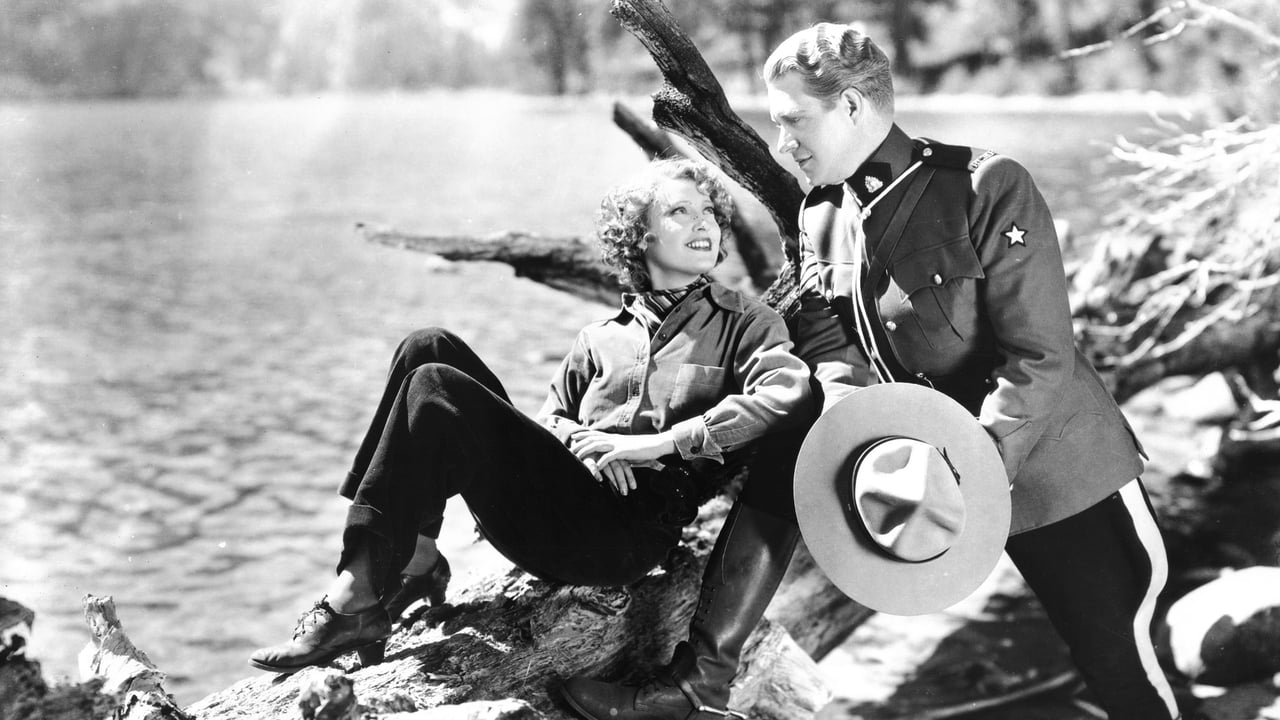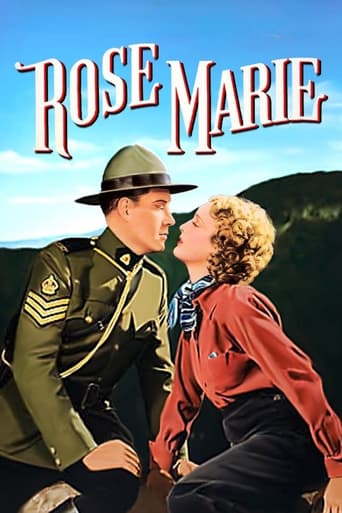



Dreadfully Boring
This movie feels like it was made purely to piss off people who want good shows
View MoreYes, absolutely, there is fun to be had, as well as many, many things to go boom, all amid an atmospheric urban jungle.
View MoreGreat movie. Not sure what people expected but I found it highly entertaining.
View MoreJeanette MacDonald is "Rose-Marie" in this 1936 film also starring Nelson Eddy, James Stewart and Allan Jones. The movie borrows its title from the Rudolf Friml operetta, but it does not use the plot or many of the songs. MacDonald plays a famous opera singer named Marie de Flor whose brother (Stewart), going by the last name of Flower, has escaped prison and killed a Mountie. She leaves at once for Quebec and winds up meeting - who else - Nelson Eddy, a Mountie who recognizes her immediately and believes at first that he is helping her get to a rendezvous with a man. Meanwhile, he's falling for her himself.Nelson and Jeannette were one of the great screen teams, and even now, they have fans all over the world. Jeanette was beautiful, a good singer and a fine actress, and Nelson, while not being much of an actor, was an attractive man with a magnificent voice. Their big hit, in fact, their signature song, "Indian Love Call," is from this film, as is, naturally, "Rose-Marie." Because of the recording devices used back then and the way female singers were taught, Jeannette's lyric-coloratura suffers somewhat. Like all female singers of that era, she has a back placement for her high notes, though the middle part of her range is quite beautiful. Her obsession with Tosca - one of the opera scenes shown, and a role she also performed on stage in real life - is a curious one. She had no business singing it, and neither did the tenor, Allan Jones, who was a lyric tenor. It's for a dramatic soprano and a spinto tenor. The Gounod "Romeo et Juliette," which she sings with Jones in the beginning of the movie is much more appropriate for both of them. Eddy, on the other hand, had operatic roots, and his baritone has survived very well. They sounded wonderful together, and there was something about them that just worked, even if he was somewhat wooden. She was spitfire enough for both of them, and it made a nice contrast. My favorite part of the film is when, after her guide steals her money, Marie goes looking for the job as a singer in a honky tonk café and tries to do "Some of these Days," which she sings operatically while attempting to copy the hoochie-coochie movements of the café's resident singer.Stewart was slowly ascending the scale to stardom, getting better and better roles - he has a couple of big scenes in this film. He's boyish, good-looking and very effective.Today I suppose these films seem very campy, and they've surely been parodied over and over again. However, the music is enjoyable, Nelson and Jeanette are treasures, and one can't help but marvel, amidst the insanity of today, what a much simpler time it was. People were able to be lifted out of themselves for a little while with fantasy and beauty. These movies must have been doing something right. Seventy-plus years later, we're still enjoying them.
View MoreThis movie was okay, but not great. I am not a big Nelson Eddy-Jeanette McDonald fan.Don't get me wrong, Jeanette McDonald has a wonderful voice, one of the best. But Nelson Eddy is extremely wooden in this movie, and his singing isn't bad, though not at all spectacular. I think Allan Jones, a tenor who had a small part in the film, had a much better voice. He was paired once with Jeanette McDonald in "The Firefly." Also, I saw 1 major flaw in the actual movie. How could Rose-Marie forgive the Seargent for throwing her brother in jail? Wasn't her brother supposed to be hanged or something? She loved her brother, too. I saw the ending as highly implausible. All she cared about was Seargent Bruce!!! But now for the positive stuff in the movie: James Stewart's acting was great, despite the fact he had a very small role. It was very interesting to see him in this movie. The Indian Love Call also added a nice touch. Jeanette McDonald sang and acted beautifully in this movie. Nelson Eddy, as well as expected from the famously wooden actor.But the movie still leaves a lot to be desired. 3/5 stars.
View MoreThe characters fulfil the usual requirements for a formula story. Rose Marie begins as a vitriolic,hire-fire personality;Serjeant Bruce does his job,but not without misgivings."It isn't always pleasant.The sad thing (or paraphrase)is when it hurts those you love." And he is wooden and stiff. Of course,he is! He's a policeman! This film offers quite a lot besides: operas from Gounod and Puccini, and Bruce,quoting "This our life,exempt from public haunt,finds sermons in stones,books in the running brooks..." from "As you like it"...hardly the stern Mountie who appears in the song. Leading up to this song,"The Mounties," there is a particularly robust,vigorous show of horsemanship---jumping brooks,hurdles,in a specially virile setting.And in the formula, their characters alter by the ending. Eddy is in excellent voice, probably at his best,hitting a high G in "Just for you", and I would challenge any baritone to accomplish, from head to chest tone, the portamento or change from F to lower A flat in "Indian Love Call". One criticism is that Eddy's moods change with very little transition,and there are many things not PC or legal these days. A socially oriented dialog occurs when she exclaims"I thought all this (the Nature) would make you more merciful". Bruce:"Don't ever think that Nature is merciful.Nature is the cruelest policeman.When an animal sickens, the others turn on him and kill him"There are good supporting roles for Reginal Owens as Myerson,Regas as the guide,and Una O'Connor as Rose Marie's maid. In all this is very good entertainment and beats much that one sees or hears these days.
View MoreThis is not even close in fidelity to the stage version of the Friml operetta. However, I didn't find this in the least annoying; though I am often a purist when it comes to musicals. The screen writers stayed with the usual Jeanette and Nelson format and it works very nicely.
View More